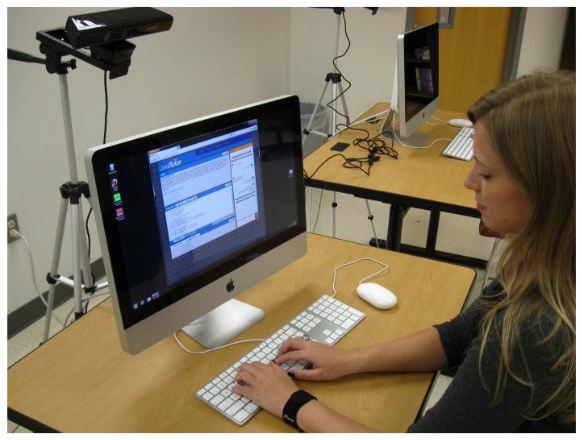Researchers track facial expressions to improve teaching software
July 1, 2013

Student workstation with depth camera, skin conductance bracelet, and computer with webcam (credit: Joseph F. Grafsgaard et al.)
Research from North Carolina State University shows that software which tracks facial expressions can accurately assess the emotions of students engaged in interactive online learning and predict the effectiveness of online tutoring sessions.
“This work is part of a larger effort to develop artificial intelligence software to teach students computer science,” says Dr. Kristy Boyer, an assistant professor of computer science at NC State and co-author of a paper on the work.
“The program, JavaTutor, will not only respond to what a student knows, but to each student’s feelings of frustration or engagement. This is important because research shows that student emotion plays an important role in the learning process.”
The researchers used the automated Computer Expression Recognition Toolbox (CERT) program to evaluate facial expressions of 65 college students engaged in one-on-one online tutoring sessions. The researchers found that CERT was able to identify facial movements associated with learning-centered emotions, such as frustration or concentration — and that the automated program’s findings were consistent with expert human assessments more than 85 percent of the time.
The researchers also had the students report how effective they felt the tutorial was, and tested the students before and after each tutoring session to measure how much they learned.
The researchers used observational data from CERT along with student self-assessments and test results to develop models that could predict how effective a tutorial session was, based on what the facial expressions of the students indicated about each student’s feelings of frustration or engagement.
“This work feeds directly into the next stage of JavaTutor system development, which will enable the program to provide cognitive and emotion-based feedback to students,” says Joseph Grafsgaard, a Ph.D. student at NC State and lead author of the paper.
The research was supported by the National Science Foundation.